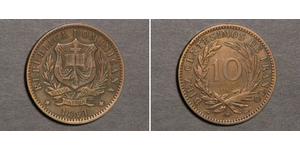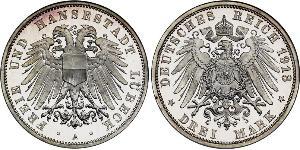(sold for $77.0)
1802, France (Consulate). "Napoleon Bonaparte/Police Department of Paris" Medal.
Medallist: Gatteux Reference: Julius 1125. Rare! Mint Year: 1802 (Year 12 of the Revolution) Condition: A nice AU-UNC with minimal deposits in obverse, light scuffing on high spots, strong mint-lustre in fields and sharp details! Denomination: Medal - Napoleon Bonaparte (as 1st Consul of the French Consulate Republic) - issued for the Police Department of Paris during 1802! Weight: 11.44gm Material: Copper Diameter: 30mm
Obverse: Laureate bust of Napoleon as 1st Consul of the French Republic right. Designer´s signature (Tiolier) below. Legend (motto of the Police Deprtment of Paris): VIGILAT UT- QUIESCANT ("He watches over them to rest!") Exergue: BONAPARTE PREM. CONSUL. ("Bonaparte, 1st Consul")
Reverse: Monogram with initials of the Police Department of Paris ("DPD" - Préfecture de police de Paris ) within wreath.
The Consulate was the government of France from the fall of the Directory in the coup of Brumaire in 1799 until the start of the Napoleonic Empire in 1804. By extension, the term The Consulate also refers to this period of French history.
During this period, Napoleon Bonaparte, as First Consul, established himself as the head of a more liberal, authoritarian, autocratic, and centralized republican government in France while not declaring himself head of state. Due to the long-lasting institutions established during these years, Robert B. Holtman has called the Consulate "one of the most important periods of all French history." Napoleon brought authoritarian personal rule which has been viewed as military dictatorship.
French military disasters in 1798 and 1799 had shaken the Directory, and eventually shattered it. Historians sometimes date the start of the political downfall of the Directory to 18 June 1799 (30 Prairial Year VII by the French Republican calendar), when Emmanuel-Joseph Sieyès with the help of Paul Barras successfully rid himself of the other then-sitting directors. An irregularity emerged in the election of Jean Baptiste Treilhard, who retired in favor of Louis Jérôme Gohier. Within days, Philippe-Antoine Merlin (Merlin de Douai) and Louis-Marie de La Revellière (La Révellière-Lépeaux) were driven to resign; Baron Jean-François-Auguste Moulin and Roger Ducos replaced them. The three new directors were generally seen[by whom?] as non-entities.
A few more military disasters, royalist insurrections in the south, Chouan disturbances in a dozen departments of the western part of France (mainly in Brittany, Maine and eventually Normandy), Orléanist intrigues, and the end became certain.[citation needed] In order to soothe the populace and protect the frontier, more than the French Revolution's usual terrorist measures (such as forced taxation or the law of hostages) was necessary. The new Directory government, led by Sieyès, decided that the necessary revision of the constitution would require "a head" (his own) and "a sword" (a general to back him). Jean Victor Moreau being unattainable as his sword, Sieyès favoured Barthélemy Catherine Joubert; but, when Joubert was killed at the Battle of Novi (15 August 1799), he turned to General Napoleon Bonaparte.
Although Guillaume Marie Anne Brune and André Masséna won the Battles of Bergen and of Zürich, and although the Allies of the Second Coalition lingered on the frontier as they had done after the Battle of Valmy, still the fortunes of the Directory were not restored. Success was reserved for Bonaparte, suddenly landing at Fréjus with the prestige of his victories in the East, and now, after Hoche's death (1797), appearing as sole master of the armies.
In the coup of 18 Brumaire Year VIII (9 November 1799), Napoleon seized French parliamentary and military power in a two-fold coup d'état, forcing the sitting directors of the government to resign. On the night of the 19 Brumaire (10 November 1799) a remnant of the Council of Ancients abolished the Constitution of the Year III, ordained the Consulate, and legalised the coup d'état in favour of Bonaparte with the Constitution of the Year VIII.
Napoleon Bonaparte (15 August 1769 – 5 May 1821) was a French military and political leader who had a significant impact on the history of Europe. He was a general during the French Revolution, the ruler of France as First Consul of the French Republic and Emperor of the First French Empire.
Born in Corsica and trained as an artillery officer in mainland France, he rose to prominence during the French Revolution and led successful campaigns against the First and Second Coalitions arrayed against France. In 1799, Napoleon staged a coup d'état and installed himself as First Consul; five years later he crowned himself Emperor of the French. In the first decade of the nineteenth century, he turned the armies of France against every major European power and dominated continental Europe through a series of military victories - epitomised in battles such as Austerlitz and Friedland. He maintained France's sphere of influence by the formation of extensive alliances and the appointment of friends and family members to rule other European countries as French client states.
The French invasion of Russia in 1812 marked a turning point in Napoleon's fortunes. His Grande Armée was wrecked in the campaign and never fully recovered. In 1813, the Sixth Coalition defeated his forces at Leipzig, invaded France and exiled him to the island of Elba. Less than a year later, he returned and was finally defeated at the Battle of Waterloo in June 1815. Napoleon spent the last six years of his life under British supervision on the island of Saint Helena, where he died in 1821. The autopsy concluded he died of stomach cancer though Sten Forshufvud and other scientists in the 1960s conjectured that he had been poisoned with arsenic.
Napoleon developed few military innovations, drew his tactics from different sources and scored major victories with a modernised French army. His campaigns are studied at military academies the world over and he is widely regarded as one of history's greatest commanders. While considered a tyrant by his opponents, he is remembered for the establishment of the Napoleonic code, which laid the administrative foundations for much of Western Europe.
Only 1$ shipping for each additional coin purchased!

|
Posted by:
anonymous 2018-04-18 |
3 Mark Free City of Lübeck Silver
group has 73 coins / 72 prices
⇑























